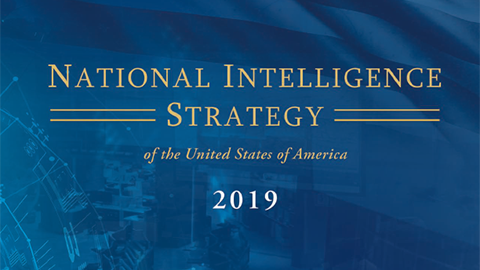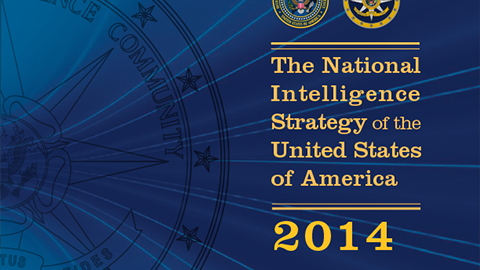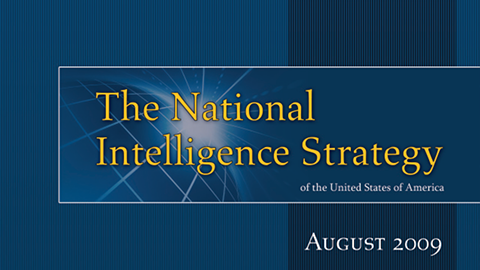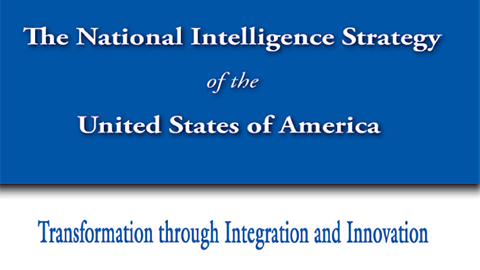Intelligence
Strategy
The 2023 NIS specifically addresses a small number of critical priorities, focusing on challenges that have proven immune to standard solutions; require a coherent, collective IC approach; or are emerging issues for which the rules have yet to be written. The resulting 2023 NIS combines aspects of mission and enterprise efforts into each goal, explicitly recognizing that a mission cannot be accomplished without people, systems and partners; conversely people, systems, and partners are not needed without a mission.
An Intelligence Community that embodies America’s values and is sufficiently agile, integrated, innovative, and resilient to inform national security and foreign policy decisions, resulting in a Nation that is secure and prosperous.
The U.S. Intelligence Community provides timely, rigorous, apolitical, and insightful intelligence and support to inform national security decisions and protect our Nation and its interests.
Following the attacks of September 11, 2001, and in the wake of the Intelligence Reform and Terrorism Prevention Act passed by Congress in 2004, Director of National Intelligence John D. Negroponte signed out the Intelligence Community’s (IC) first National Intelligence Strategy. The strategy explained that the Intelligence Community’s clear charge was to:
- Integrate the domestic and foreign dimensions of U.S. intelligence so that there are no gaps in our understanding of threats to our national security;
- Bring more depth and accuracy to intelligence analysis; and
- Ensure that U.S. intelligence resources generate future capabilities as well as present results.
Now, almost twenty years after our first strategy was issued, the Intelligence Community’s charge remains just as clear, even as the strategic environment has changed dramatically. The United States faces an increasingly complex and interconnected threat environment characterized by strategic competition between the United States, the People’s Republic of China (PRC), and the Russian Federation, felt perhaps most immediately in Russia’s ongoing aggression in Ukraine. In addition to states, sub-national and non-state actors—from multinational corporations to transnational social movements—are increasingly able to create influence, compete for information, and secure or deny political and security outcomes, which provides opportunities for new partnerships as well as new challenges to U.S. interests. In addition, shared global challenges, including climate change, human and health security, as well as emerging and disruptive technological advances, are converging in ways that produce significant consequences that are often difficult to predict.
As Director of National Intelligence, I have the privilege of leading an Intelligence Community that provides decision-makers and citizens crucial insights on this diverse and complex landscape. Our support to policymakers, operators, and warfighters is critically dependent on our ability to look beyond the immediate horizon to ensure the Intelligence Community is well postured to address emerging threats, promote national resilience and innovation, defend our competitive advantage, and promote shared prosperity. This National Intelligence Strategy, therefore, lays out the Intelligence Community’s role in supporting the priorities outlined in the President’s National Security Strategy and serves as the Community’s direction for the next four years as we seek to better serve the Nation.
The six goals outlined in this National Intelligence Strategy have emerged as our understanding of the kinds of information, technology, and relationships needed to be effective in the future has expanded. Whether we are successful in achieving these goals will depend on whether we can maintain a talented and diverse workforce, and whether we can adapt, increase resilience, and sustain our focus on overcoming the challenges of a rapidly changing environment. I believe we have the capacity, will, and talent to do so.

Avril D. Haines
Director of National Intelligence
Our success as a Community is measured as much by our defense of America’s values as it is by the execution of our intelligence mission. The 2023 National Intelligence Strategy recognizes that a purposeful and clear set of ethics serves as a cornerstone of the United States Intelligence Community’s mission.
As members of the intelligence profession, we conduct ourselves in accordance with certain basic principles. These principles are stated below, and reflect the standard of ethical conduct expected of all Intelligence Community personnel, regardless of individual role or agency affiliation. Many of these principles are also reflected in other documents that we look to for guidance, such as statements of core values, and the Code of Conduct: Principles of Ethical Conduct for Government Officers and Employees; it is nonetheless important for the Intelligence Community to set forth in a single statement the fundamental ethical principles that unite us—and distinguish us—as intelligence professionals.
- MissionWe serve the American people, and understand that our mission requires selfless dedication to the security of our Nation.
- TruthWe seek the truth; speak truth to power; and obtain, analyze, and provide intelligence objectively.
- LawfulnessWe support and defend the Constitution, and comply with the laws of the United States, ensuring that we carry out our mission in a manner that respects privacy, civil liberties, and human rights obligations.
- IntegrityWe demonstrate integrity in our conduct, mindful that all our actions, whether public or not, should reflect positively on the Intelligence Community at large.
- StewardshipWe are responsible stewards of the public trust; we use intelligence authorities and resources prudently, protect intelligence sources and methods diligently, report wrongdoing through appropriate channels; and remain accountable to ourselves, our oversight institutions, and through those institutions, ultimately to the American people.
- ExcellenceWe seek to improve our performance and our craft continuously, share information responsibly, collaborate with our colleagues, and demonstrate innovation and agility when meeting new challenges.
- DiversityWe embrace the diversity of our Nation, promote diversity and inclusion in our workforce, and encourage diversity in our thinking.
Strategic competition from powers that layer authoritarian governance with a revisionist foreign policy is a principal challenge to a free, open, secure, and prosperous world. The PRC is the only U.S. competitor with both the intent to reshape the international order and, increasingly, the economic, diplomatic, military, and technological power to do so.
The IC’s future success depends on its ability to attract and retain a highly technical and talented workforce that draws on one of our country’s unmatched reservoirs of strength: our diversity. Varied backgrounds, perspectives, and experiences strengthen our workforce, our ability to deliver on our Mission, and the trust of the American public.
Promoting technical and tradecraft competitiveness and innovation for the Intelligence Community requires sustained investment and rapid adaptation of interoperable solutions at scale. The Community will remove barriers by establishing unified IC procurement authorities, centralized solicitation systems, and a Community-wide contracting system, all bolstered by automation tools.
Our unmatched network of alliances and partnerships around the world is our most important strategic asset—and a force multiplier for our intelligence mission. Our ability to leverage and work in concert with a broad set of partners enhances our operational capabilities, sharpens our insights, and strengthens the foundation for strategic relationships and common action between our governments.
A highly connected and complex world means that transnational and transboundary challenges are having increasingly broad implications for U.S. interests in every region and in multiple domains. The world is facing more frequent and intense crises due to the effects of climate change, narcotics trafficking, financial crises, supply chain disruptions, corruption, new and recurring diseases, and emerging and disruptive technologies.
The IC has an expanding role in supporting the resilience of the Nation, its allies, and its partners, particularly in a world still emerging from the COVID-19 pandemic. In this increasingly complex environment, risk assumed by one is effectively assumed by all, resulting in the need for a multifaceted, layered, and distributed approach that adapts as the threat evolves.
The Intelligence Community is an integrated enterprise comprised of 18 Executive Branch agencies and organizations (generally referred to as “IC elements”) that conduct a variety of intelligence activities and work together to promote national security. The Director of National Intelligence (DNI) is the leader of the IC and sets IC strategic priorities through the National Intelligence Strategy. Each IC member contributes through the execution of its organization’s mission in accordance with statutory responsibilities.
The IC is comprised of the following 18 elements:
Two Independent Agencies
- The Office of the Director of National Intelligence (ODNI)
- The Central Intelligence Agency (CIA)
Nine Department of Defense Elements The following elements also receive guidance and oversight from the Under Secretary of Defense for Intelligence and Security (USD I&S)—
- The Defense Intelligence Agency (DIA)
- The National Security Agency (NSA)
- The National Geospatial-Intelligence Agency (NGA)
- The National Reconnaissance Office (NRO)
- U.S. Air Force Intelligence
- U.S. Navy Intelligence
- U.S. Army Intelligence
- U.S. Marine Corps Intelligence
- U.S. Space Force Intelligence
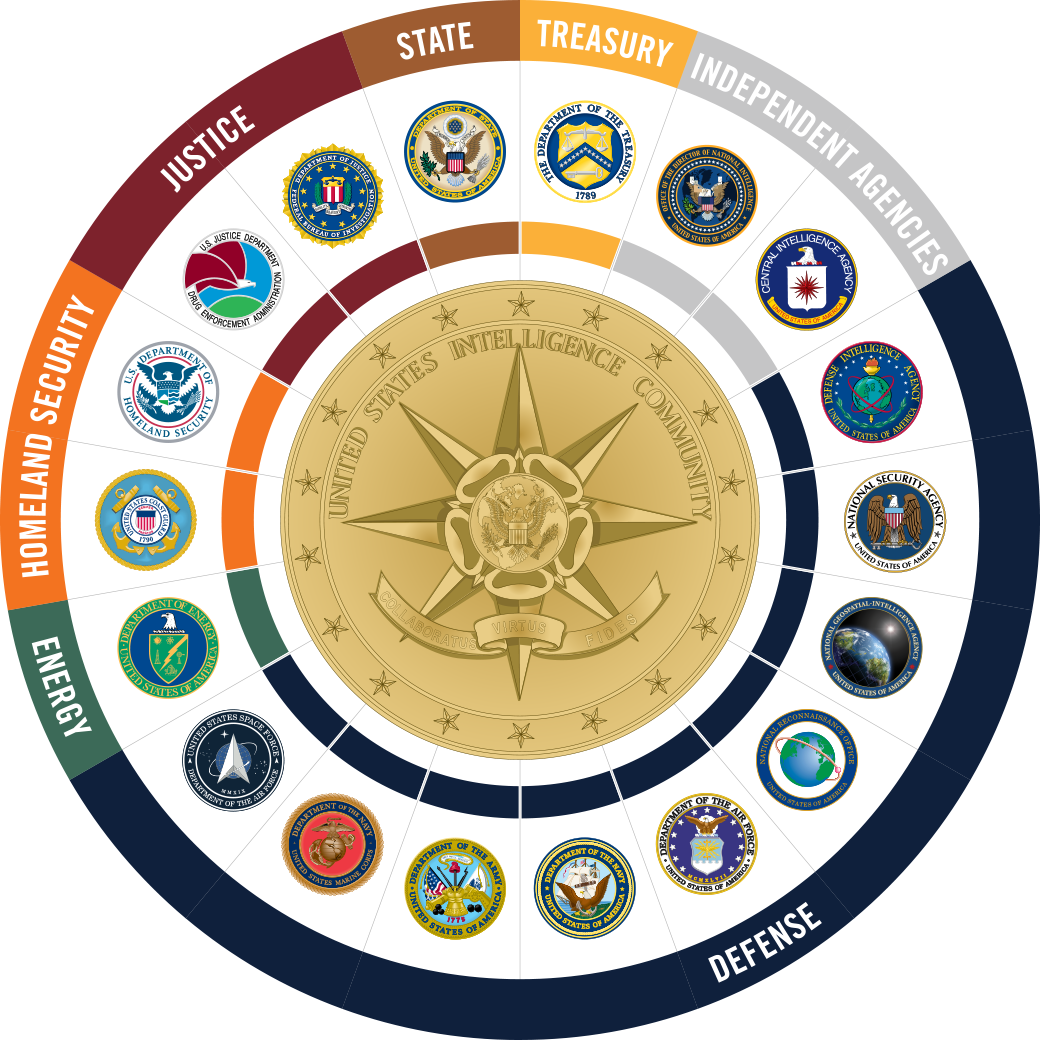
Seven Elements of other Departments and Agencies
- The Department of Energy’s Office of Intelligence and Counterintelligence
- The Department of Homeland Security’s Office of Intelligence and Analysis and
- The intelligence and counterintelligence elements of the U.S. Coast Guard
- The Department of Justice’s Federal Bureau of Investigation and
- The Drug Enforcement Administration’s Office of National Security Intelligence
- The Department of State’s Bureau of Intelligence and Research
- The Department of the Treasury’s Office of Intelligence and Analysis
In addition to collection, analysis, and production, IC elements serve in other roles. Functional managers oversee and coordinate a specific intelligence discipline or capability and advise the DNI on the performance of their functions within and across IC elements. Program managers are IC element heads responsible for the execution of their element’s mission and budget. ODNI leads intelligence integration across these elements to deliver the most insightful intelligence and make the Nation more secure.
The NIS provides the IC with the DNI’s strategic direction for the next four years, aligns IC priorities with other national strategies, and supports the IC’s mission to provide timely, rigorous, apolitical, and insightful intelligence and support to inform national security decisions and protect our Nation and its interests.
Download the NIS PDF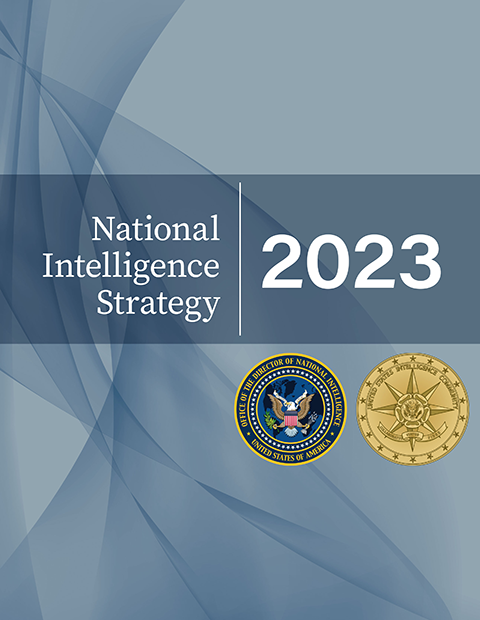
The 2019, 2014, 2009, and 2005 installments of the NIS are available for download here.
